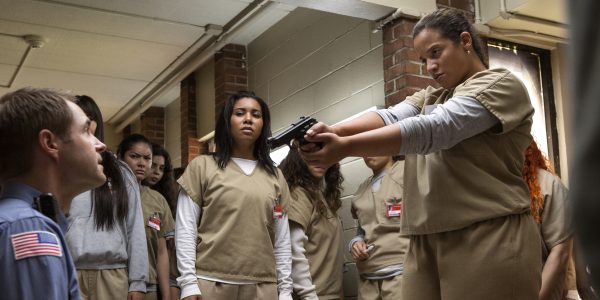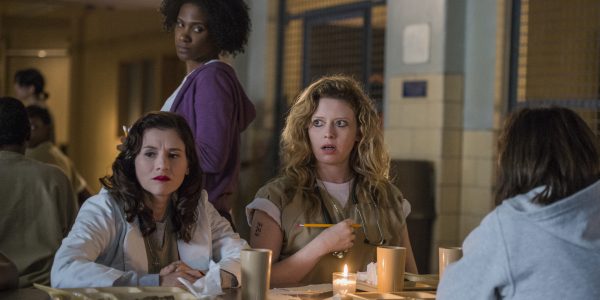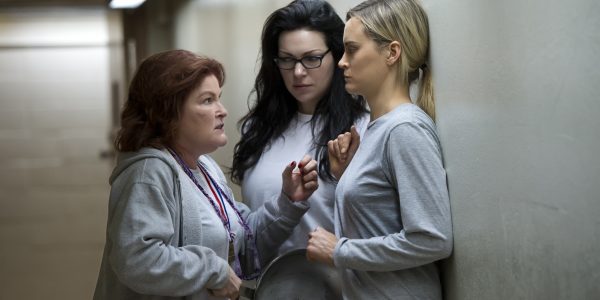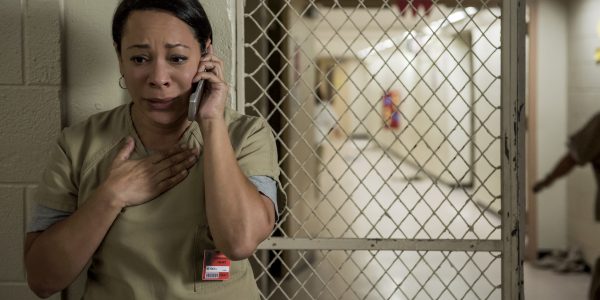Orange is the New Black (Spoiler-Free) Season Five Review
I
loved season four of
Orange is the New Black. I even named it
the best show of 2016. So, I had high hopes that it could maintain the same level of quality, balancing the dual comedic and dramatic elements that have made the show into one of the finest on television. However, after watching ten of the thirteen episodes of the show’s fifth season, I am ambivalent. The season’s high points are truly great. But there are enough missteps (often when the story shifts to more comedic fare), that I was left feeling lost and disappointed throughout the season.
The major problem with the season is its inability to find the right tone. A bit of a refresher for those who may have forgotten: Season four ended with a prison riot breaking out in response to the prison’s failure to acknowledge that Poussey was killed as a result of a guard’s negligence. The final shot of the season was Daya standing over two guards holding a gun while the other inmates urged her to shoot. That’s a tense way to end a season, and it’s a great way to start a new one.

So, with a riot taking up the main action of the season, one would expect things to be tense. One would expect the specter of Poussey to hang heavy on the minds of those who knew her (and for her brutal death to remain a focus of the other inmates). And, to a point, that’s all true. Poussey is mentioned several times, and her death still resonates with several characters (although, aside from Soso and Taystee, even those characters tend to forget about her and only remember her when it’s convenient to the plot). But the drama of the riot (which includes a gun that makes its way through a chain of the various inmates, and, in the tradition of Chekhov, goes off more than once), is blunted with a number of broad comedic moments that shatter the mood of episodes and come off as just plain silly.
Orange has always been a dramedy. Even when it’s delving into some of the darkest elements of humanity, there’s room within the series for levity. In fact, the show needs those moments to temper the darkness and make the show watchable. But a lot of the comedy in season five seems at odds with the dark moments the series churns out. There’s a particularly awful assault on a character near the end of the season. It’s a riveting scene, well-acted, and hard to watch. But it butts up against a Keystone Cops-level take down of a villainous character. Sure, it relieves the tension of the previous scene, but it also shatters the emotional moment the viewer was having.
We know, after season four, the Jenji Kohan and her writing staff are masters at crafting complex and unflinching dramatic sequences. We also know they can put together some truly wonderful comedic moments (just think back to Suzanne’s sci-fi novel, which expertly tempered her painful backstory). And, in the past, they’ve been successful in finding the right balance (a difficult thing to achieve). Season five doesn’t have that balance. It’s not constructed nearly as intricately as season four, and it jars the viewer out of their emotional connection to moments and characters with broad switches from drama to comedy.

The structure of the season doesn’t help the balance, either. Set over the course of three days, there’s far more filler material than in past seasons. We know the bulk of the action will occur near the end of the riot, thus early episodes are spent moving people to the right places for whatever showdown is set to happen. So, we get several episodes of Red (Kate Mulgrew) and Blanca (Laura Gomez, who makes the most of her increased screen time) high on “vitamins,” while the season meanders to their arc’s climax. The story has its fun moments, but it takes far too long to reach any sort of point. And that’s generally true across the board.
One episode centers on the inmates forcing the guards to perform a talent show. Fun, and with a dark edge to it, but it ultimately doesn’t matter to the overall arc of the season. It’s just a way to kill some time while the story pushes to the climax of the riot. After a season spent showing us how awful and abusive these guards could be, it's strange to see them treated as objects of comedy. Yes, some of the inmates treatment of the guards under their control boarders on abuse (they certainly aren't kept in the best conditions), but we were conditioned last year to think of these people as dangerous. Now they are just jokes. In another arc, Alex starts a commune out in the yard, which offers a nice respite from some of the more dramatic stories inside the prison, but it doesn’t really matter (beyond having Piper finally admit that she’s the worst).

But there are some absolutely stellar performances woven into the fabric of the story. Danielle Brooks (Taystee) has turned into the true star of the series. Taystee is the inmate most deeply affected by Poussey’s death, and the one who leads the crusade to get her some form of justice. It’s an equally heartbreaking and heartening performance that moved me to tears more than once (especially in Taystee’s flashback episode, which I suspect will be particularly moving for everyone).
Natasha Lyonne’s Nicky has some really great moments, as she finally begins to take steps grow up and take responsibility for her own life. Selenis Leyva is riveting as Gloria this season, as she tries to help her surrogate daughter Daya (who is, as you can imagine, not in a good place), and manage a crisis with her family outside of Litchfield. It’s an arc that requires a delicate touch, and Leyva knocks it out of the park.

And yes, some of the comedic moments land. There are light moments that flow well amongst the drama. But that doesn’t make up for the jarring elements that grate against the show's dramatic strengths.
It's entirely possible that the season's final three episodes pull the entire season together, but that still won't make up for the uneven lead up to the end. Season five certainly isn't a bad season of television. And, out of all shows on Netflix,
Orange is the New Black has such a deep bench of actors and characters that a weaker season only means the show can bounce back next year with a greater focus on new faces. But season five is a misstep that doesn't capitalize on the strengths of the previous season, and doesn't properly balance the two tonal halves of the series in a proper way.
Pros
- Some strong characters arcs for Nicky, Gloria, and Tasytee
- Danielle Brooks is great
Cons
- Season structure leads to drawn out stories
- Poor balance of drama and comedy
 So, with a riot taking up the main action of the season, one would expect things to be tense. One would expect the specter of Poussey to hang heavy on the minds of those who knew her (and for her brutal death to remain a focus of the other inmates). And, to a point, that’s all true. Poussey is mentioned several times, and her death still resonates with several characters (although, aside from Soso and Taystee, even those characters tend to forget about her and only remember her when it’s convenient to the plot). But the drama of the riot (which includes a gun that makes its way through a chain of the various inmates, and, in the tradition of Chekhov, goes off more than once), is blunted with a number of broad comedic moments that shatter the mood of episodes and come off as just plain silly.
Orange has always been a dramedy. Even when it’s delving into some of the darkest elements of humanity, there’s room within the series for levity. In fact, the show needs those moments to temper the darkness and make the show watchable. But a lot of the comedy in season five seems at odds with the dark moments the series churns out. There’s a particularly awful assault on a character near the end of the season. It’s a riveting scene, well-acted, and hard to watch. But it butts up against a Keystone Cops-level take down of a villainous character. Sure, it relieves the tension of the previous scene, but it also shatters the emotional moment the viewer was having.
We know, after season four, the Jenji Kohan and her writing staff are masters at crafting complex and unflinching dramatic sequences. We also know they can put together some truly wonderful comedic moments (just think back to Suzanne’s sci-fi novel, which expertly tempered her painful backstory). And, in the past, they’ve been successful in finding the right balance (a difficult thing to achieve). Season five doesn’t have that balance. It’s not constructed nearly as intricately as season four, and it jars the viewer out of their emotional connection to moments and characters with broad switches from drama to comedy.
So, with a riot taking up the main action of the season, one would expect things to be tense. One would expect the specter of Poussey to hang heavy on the minds of those who knew her (and for her brutal death to remain a focus of the other inmates). And, to a point, that’s all true. Poussey is mentioned several times, and her death still resonates with several characters (although, aside from Soso and Taystee, even those characters tend to forget about her and only remember her when it’s convenient to the plot). But the drama of the riot (which includes a gun that makes its way through a chain of the various inmates, and, in the tradition of Chekhov, goes off more than once), is blunted with a number of broad comedic moments that shatter the mood of episodes and come off as just plain silly.
Orange has always been a dramedy. Even when it’s delving into some of the darkest elements of humanity, there’s room within the series for levity. In fact, the show needs those moments to temper the darkness and make the show watchable. But a lot of the comedy in season five seems at odds with the dark moments the series churns out. There’s a particularly awful assault on a character near the end of the season. It’s a riveting scene, well-acted, and hard to watch. But it butts up against a Keystone Cops-level take down of a villainous character. Sure, it relieves the tension of the previous scene, but it also shatters the emotional moment the viewer was having.
We know, after season four, the Jenji Kohan and her writing staff are masters at crafting complex and unflinching dramatic sequences. We also know they can put together some truly wonderful comedic moments (just think back to Suzanne’s sci-fi novel, which expertly tempered her painful backstory). And, in the past, they’ve been successful in finding the right balance (a difficult thing to achieve). Season five doesn’t have that balance. It’s not constructed nearly as intricately as season four, and it jars the viewer out of their emotional connection to moments and characters with broad switches from drama to comedy.
 The structure of the season doesn’t help the balance, either. Set over the course of three days, there’s far more filler material than in past seasons. We know the bulk of the action will occur near the end of the riot, thus early episodes are spent moving people to the right places for whatever showdown is set to happen. So, we get several episodes of Red (Kate Mulgrew) and Blanca (Laura Gomez, who makes the most of her increased screen time) high on “vitamins,” while the season meanders to their arc’s climax. The story has its fun moments, but it takes far too long to reach any sort of point. And that’s generally true across the board.
One episode centers on the inmates forcing the guards to perform a talent show. Fun, and with a dark edge to it, but it ultimately doesn’t matter to the overall arc of the season. It’s just a way to kill some time while the story pushes to the climax of the riot. After a season spent showing us how awful and abusive these guards could be, it's strange to see them treated as objects of comedy. Yes, some of the inmates treatment of the guards under their control boarders on abuse (they certainly aren't kept in the best conditions), but we were conditioned last year to think of these people as dangerous. Now they are just jokes. In another arc, Alex starts a commune out in the yard, which offers a nice respite from some of the more dramatic stories inside the prison, but it doesn’t really matter (beyond having Piper finally admit that she’s the worst).
The structure of the season doesn’t help the balance, either. Set over the course of three days, there’s far more filler material than in past seasons. We know the bulk of the action will occur near the end of the riot, thus early episodes are spent moving people to the right places for whatever showdown is set to happen. So, we get several episodes of Red (Kate Mulgrew) and Blanca (Laura Gomez, who makes the most of her increased screen time) high on “vitamins,” while the season meanders to their arc’s climax. The story has its fun moments, but it takes far too long to reach any sort of point. And that’s generally true across the board.
One episode centers on the inmates forcing the guards to perform a talent show. Fun, and with a dark edge to it, but it ultimately doesn’t matter to the overall arc of the season. It’s just a way to kill some time while the story pushes to the climax of the riot. After a season spent showing us how awful and abusive these guards could be, it's strange to see them treated as objects of comedy. Yes, some of the inmates treatment of the guards under their control boarders on abuse (they certainly aren't kept in the best conditions), but we were conditioned last year to think of these people as dangerous. Now they are just jokes. In another arc, Alex starts a commune out in the yard, which offers a nice respite from some of the more dramatic stories inside the prison, but it doesn’t really matter (beyond having Piper finally admit that she’s the worst).
 But there are some absolutely stellar performances woven into the fabric of the story. Danielle Brooks (Taystee) has turned into the true star of the series. Taystee is the inmate most deeply affected by Poussey’s death, and the one who leads the crusade to get her some form of justice. It’s an equally heartbreaking and heartening performance that moved me to tears more than once (especially in Taystee’s flashback episode, which I suspect will be particularly moving for everyone).
Natasha Lyonne’s Nicky has some really great moments, as she finally begins to take steps grow up and take responsibility for her own life. Selenis Leyva is riveting as Gloria this season, as she tries to help her surrogate daughter Daya (who is, as you can imagine, not in a good place), and manage a crisis with her family outside of Litchfield. It’s an arc that requires a delicate touch, and Leyva knocks it out of the park.
But there are some absolutely stellar performances woven into the fabric of the story. Danielle Brooks (Taystee) has turned into the true star of the series. Taystee is the inmate most deeply affected by Poussey’s death, and the one who leads the crusade to get her some form of justice. It’s an equally heartbreaking and heartening performance that moved me to tears more than once (especially in Taystee’s flashback episode, which I suspect will be particularly moving for everyone).
Natasha Lyonne’s Nicky has some really great moments, as she finally begins to take steps grow up and take responsibility for her own life. Selenis Leyva is riveting as Gloria this season, as she tries to help her surrogate daughter Daya (who is, as you can imagine, not in a good place), and manage a crisis with her family outside of Litchfield. It’s an arc that requires a delicate touch, and Leyva knocks it out of the park.
 And yes, some of the comedic moments land. There are light moments that flow well amongst the drama. But that doesn’t make up for the jarring elements that grate against the show's dramatic strengths.
It's entirely possible that the season's final three episodes pull the entire season together, but that still won't make up for the uneven lead up to the end. Season five certainly isn't a bad season of television. And, out of all shows on Netflix, Orange is the New Black has such a deep bench of actors and characters that a weaker season only means the show can bounce back next year with a greater focus on new faces. But season five is a misstep that doesn't capitalize on the strengths of the previous season, and doesn't properly balance the two tonal halves of the series in a proper way.
And yes, some of the comedic moments land. There are light moments that flow well amongst the drama. But that doesn’t make up for the jarring elements that grate against the show's dramatic strengths.
It's entirely possible that the season's final three episodes pull the entire season together, but that still won't make up for the uneven lead up to the end. Season five certainly isn't a bad season of television. And, out of all shows on Netflix, Orange is the New Black has such a deep bench of actors and characters that a weaker season only means the show can bounce back next year with a greater focus on new faces. But season five is a misstep that doesn't capitalize on the strengths of the previous season, and doesn't properly balance the two tonal halves of the series in a proper way.